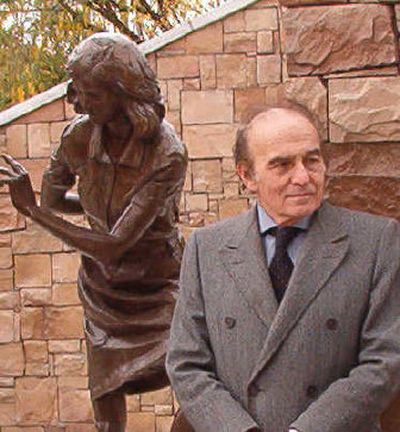Holocaust survivor shares lessons learned

BOISE – In a world fraught with hatred and danger, humanity still can triumph – that’s one lesson Samuel Pisar has learned from his remarkable life.
“Man is as capable of the worst as of the best, of madness as of genius,” Pisar said, “and the unspeakable, the unimaginable remains possible – that is what I learned when my world collapsed and I lost literally everyone and everything around me.”
Pisar was among the youngest survivors of the Nazi death camps of the Holocaust – he was 10 when the Soviets occupied Poland and his life changed forever, and had just turned 16 when he escaped the death camps and scrambled, emaciated, through machine-gun fire to the American soldiers who rescued him – the only survivor of his family and his school. Today he is an international lawyer who practices in Paris, New York and London, an influential author and a voice for international cooperation. Pisar was in Boise on Thursday to give the keynote address at the 22nd annual Frank Church Conference on Public Affairs.
“I’m not a pessimistic person, because even though my childhood and my adolescence were immensely tragic, I have also enjoyed after it was over a certain triumph of life, and I know that it’s never lost,” Pisar said in an interview. “I remain an optimist.”
Yet Pisar worries. “The world is again enflamed. For people like myself, it is important to repeat the warning that we must be alert and do something to make sure that past does not become prologue.”
Pisar’s 1970 best seller, “Coexistence and Commerce,” influenced United States policies toward Eastern Europe, the Soviet Union and China under the Nixon administration, when the Cold War began to warm with the opening of trade.
Today, with the threat of terrorism and war around the globe, Pisar said the world again is in danger of descending to the depths he experienced in the Holocaust.
“Weapons of mass destruction – it’s a potential gas chamber to me,” he said.
“There is the fact that the Western alliance is pulling itself apart, and of course there is terrorism.”
The answer, he said, lies not just in conflict, but in engagement and cooperation.
“In a world that is full of misery and hunger and humiliation on many continents, violent terrorism can thrive more easily than in a world that sees some kind of opportunity to progress, to prosperity,” he said. “Unless the rich countries open some meaningful doors to them, we risk having an increasingly insurrectional environment in which we and our children will have to live.”
Pisar spent his early childhood in the thriving Jewish community of Bialystok, Poland, where his prominent family had lived for three centuries.
Then came the Nazis. His father was executed by the Gestapo, and the last he saw of his mother and 8-year-old sister was when they were marched off to a different railroad cattle car than him, bound for the gas chambers.
His mother had dressed him in long pants, so that at 13 he could go with the men – one of many times his life was narrowly spared.
He learned to survive in the camps by making himself tough, independent and resourceful. When the guards called for tailors, he claimed to be a buttonhole-maker, and was shipped to a work camp where German army uniforms were being sewn.
Later, at another of the camps, he was selected for a group headed for the gas chambers.
As the group was lined up in a room, Pisar spotted a bucket and brush off to the side, sidled over, seized them and began scrubbing the floor as if it were his job. Amid ribbing from the guards, the young teen scrubbed every inch of the floor right up to the door – then returned to his barracks alive, rather than being executed with the rest of the group.
After his liberation, he became a 16-year-old black marketeer and thrived in a lawless post-war Germany before relatives persuaded him to go to Australia. He went on to earn degrees from Harvard and the Sorbonne, served on President Kennedy’s task force on foreign economic policy, worked for Congress and practiced international law. He was made a U.S. citizen by a special act of Congress in 1961.
In 1979 he published his autobiography, “Of Blood and Hope.”
In Washington, D.C., Pisar was a close friend of the late Idaho Sen. Frank Church and his wife, Bethine, and often testified before Church when Church chaired the Foreign Relations Committee and the Subcommittee on Multi-National Corporations.
“That’s why I didn’t hesitate to accept” the speaking engagement at the Frank Church Conference, Pisar said. This year’s conference focuses on “Global Flash Points: Clash of Cultures.”
In addition to Pisar, the conference featured Middle East diplomat and author John Habib and former Canadian ambassador to the United Nations Paul Heinbecker.